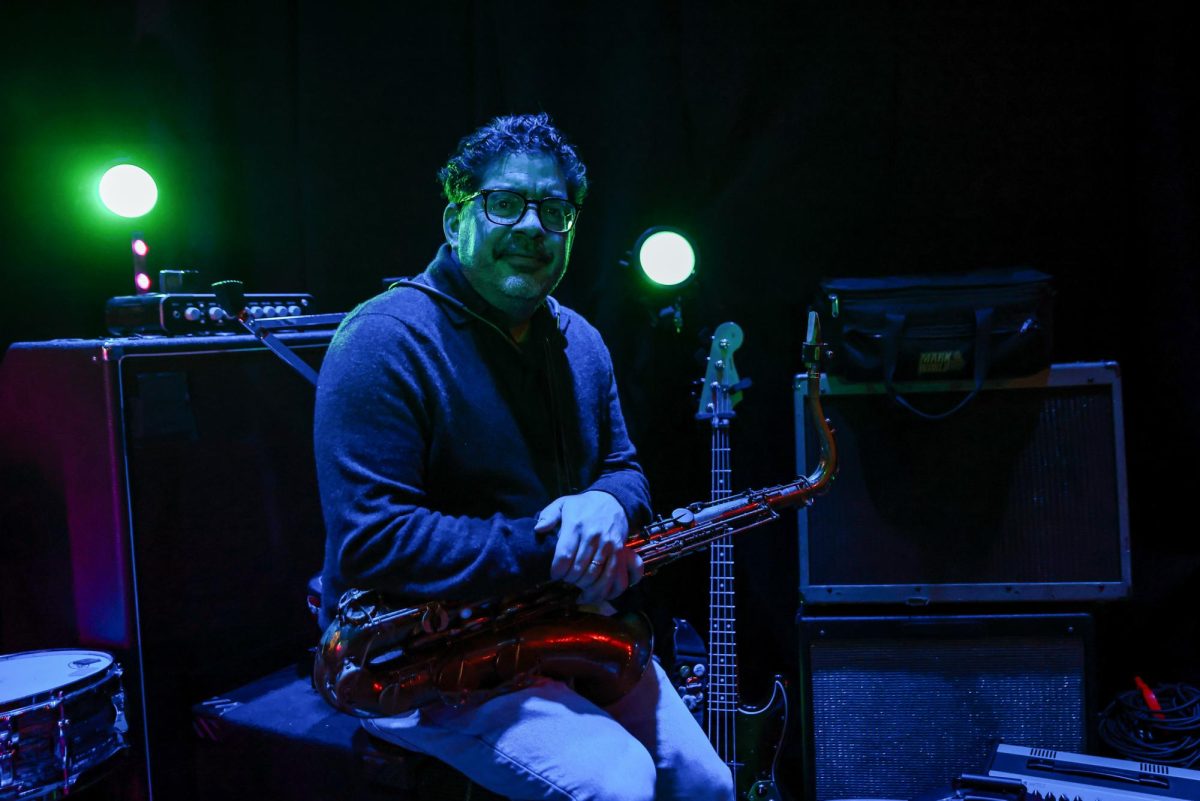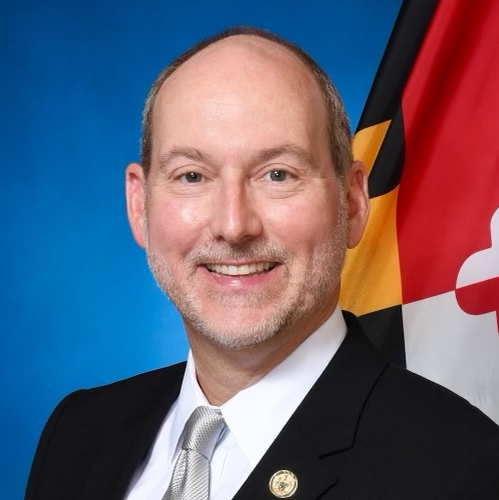Updated: March 27, 2023, at 5:21 p.m.
For most students, it’s hard to imagine their professors in any setting besides the classroom — let alone rocking out in churches or performing at the Kennedy Center.
But, from punk rock to hip-hop and everything else in between, GW faculty can be found playing music at venues across the D.C. area. These professors take their love of music outside of the classroom, whether performing is a full-time gig or a passion project.
Lawyer by day, saxophonist by night
Besides teaching in the classroom and arguing in the courtroom, Mike Nilsson, an adjunct professor of media law, plays the saxophone on stage.
A saxophonist since fourth grade, Nilsson joined indie rock band NAYAN 12 years ago. Nilsson said bandleader Nayan Bhula recruited him after hearing him play in a different band.
The band, which was formerly known as The NRIs and consists of four other middle-aged career men, released its album, “Rock N Roll Ruined My Life,” in February, a record chock-full of groovy bass lines and roaring sax solos. Nilsson said although NAYAN often gets compared to Bruce Springsteen because of the saxophone’s presence — despite Bhula not being “Born in the U.S.A.” and the band lacking Springsteen’s Jersey roots — they take influence from all rock genres.
“There’s a little bit of punk there, there’s a little bit of prog rock, there’s a little bit of all kinds of early alts, indie rock,” Nilsson said.
With twice-monthly rehearsals and an average of one gig a month, Nilsson said he has “no idea” how he balances NAYAN with teaching and being a lawyer with children. Nevertheless, Nilsson said now that their album is out and NAYAN is on Spotify, the band will be performing more, including at Artomatic and Galactic Panther in April — a switch up from previous gigs at iconic venues in The District like DC9 and Black Cat.
Nilsson said performing in NAYAN lets him pretend he’s a kid again, a phenomenon he’s passing to his son, an 11-year-old guitar player who listens to ’80s hair metal.
“I’m 53, and not many people of that age get to go out and perform, and of those who do, even fewer get to go and perform their own indie music at actual kind of rock and roll clubs,” Nilsson said. “It’s a real blessing to be able to do that.”
Carrying on the D.C. punk legacy
When he’s not teaching, Alexander Dent, a professor of anthropology and international affairs, revels in D.C.’s punk rock scene with his band Weird Babies.
Dent, whose roles in the band involve playing guitar and “screaming my voice out,” said he became friends with bass player and co-vocalist Josh Freed after they met through the elementary school their children attended. He said their shared love of music led them to form their band in 2015 with drummer and Department of Energy official Avi Zevin, whom Freed knew from his work in the environmental policy field.
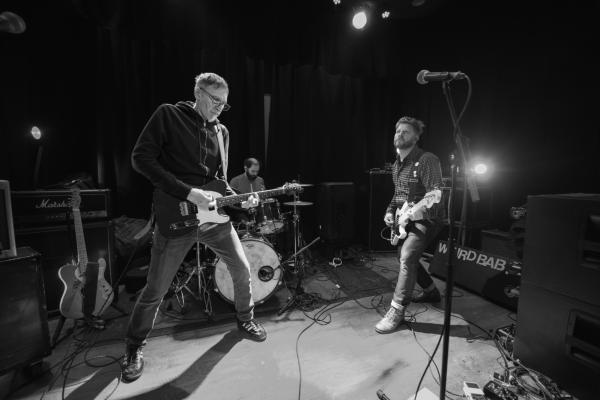
“Josh and I just finally started talking about forming a band,” Dent said. “And we got together and realized that we write really well together.”
With their noisy, guitar-driven sound and impassioned vocal delivery, Dent said Weird Babies draws inspiration from the lauded lineage of D.C. punk bands, like Minor Threat and Fugazi.
“We all like loud and noise, and we don’t like flatly delivered lyrics,” Dent said.
Since 2015, Weird Babies has played a variety of classic venues in D.C., like DC9, The Pocket and Pie Shop. They have also performed at alternative locales, like St. Stephen and the Incarnation Episcopal Church — a church in Mount Pleasant that is a beloved music and activism venue for the D.C. punk community.
Dent said there’s an increasing engagement with punk rock among young Washingtonians, as more artists utilize sound to discuss themes of race, gender and sexuality.
“I think because the music is expanding in terms of racial identification and gender identification, it’s starting to speak to some younger audiences again, the way maybe it didn’t quite a decade ago,” Dent said.
Teaching the future of hip-hop
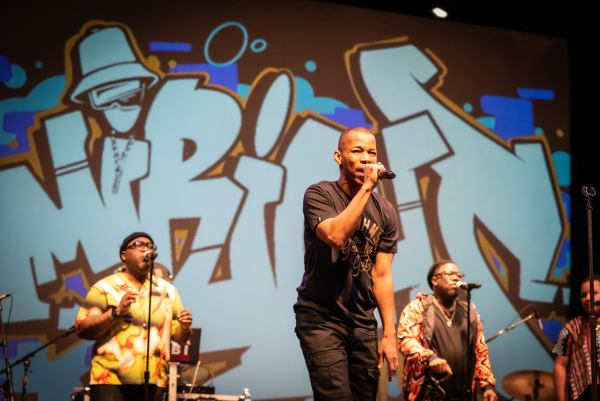
For Dumisani Ndlovu, an adjunct professor who coaches GW’s Hip Hop Ensemble, bringing his lifelong hip-hop passion to students was a recent undertaking.
Ndlovu said after being drawn to the authenticity of hip-hop’s subject matter, he began writing rhymes and released his debut album in 1992 with the group Zimbabwe Legit. Since then, Ndlovu has released music under the name Dumi Right and has performed frequently around the D.C. area, including at the Kennedy Center last year and at last summer’s Hip Hop Block Party at the African American History Museum.
Ndlovu said he originally brought his hip-hop expertise to GW as a guest speaker in professor Loren Kajikawa’s Hip Hop History and Culture class, before being enlisted in 2022 to start the GW Hip Hop Ensemble, a group of musical talents who meet each week to craft songs.
“It’s always good to be a practitioner of something you’re teaching,” Ndlovu said.
The GW Hip Hop Ensemble rehearses every Thursday and performs at the end of each semester, with pop-up performances throughout the year. Ndlovu said the ensemble allows students with instrumental, vocal and rap backgrounds to collaborate and learn from his practical experience.
“I really just enjoy seeing the development, engagement of the students,” Ndlovu said.
Touring the world with the Navy Band
Before he was GW’s director of band activities, Michael Schmitz performed in, conducted and produced for the United States Navy Band from 1990 to 2020.
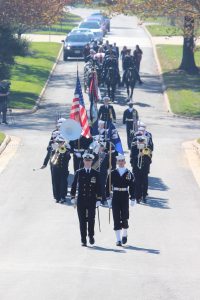
Schmitz, who primarily plays the trombone, said his three-decade run in the Navy Band allowed him to explore his love of performing and bringing music to people around the world. During his time with the Navy Band, he played in every state in the continental United States; six presidential inaugurations, from Bill Clinton to Donald Trump; and multiple other countries, including Russia, Sweden and Canada.
“To be able to play and perform in a group like that is just amazing,” Schmitz said.
Schmitz said one of the most rewarding parts of being in the Navy Band was playing for funerals at Arlington National Cemetery. He added that when he did the “rough math,” he found that he had played in between 4,000 to 5,000 funerals at Arlington throughout his career.
“To do that, for the veterans and people in their last moments with their loved ones, it was probably the most honorable thing I could do as a musician,” Schmitz said.
In 2019, Schmitz said he decided to return to teaching for the first time since working as a high school music teacher. Schmitz’s first year at GW was also his last year with the Navy Band, leading to frequent outfit changes between his Navy Band performances and GW classes each week.
“I would literally finish ceremonies at Arlington Cemetery, go in the restroom, change out of my uniform and boogie over to GW to start my band rehearsals here,” Schmitz said.
From notepad to stage
While some people start bands just to cover other people’s songs, Mark Edberg, a professor of prevention and community health, said he founded his group to make his original music heard.
“It was just the desire to kind of really do that original music that I had already been writing,” Edberg said.
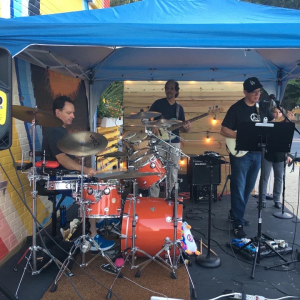
Edberg said he acts as a songwriter, lead guitarist, vocalist and sometimes tenor saxophonist for modern rock band Black Shag Sherpas. Edberg said they still play some original music he wrote in the 1990s for his now-defunct band The Furies, though he is the only person in Black Shag Sherpas who was a part of the older group.
The band, consisting of four other members whom Edberg said he found via music networking site BandMix and Facebook, performs new music while also working through The Furies’ old discography.
Edberg said the guitar-heavy sound of Black Shag Sherpas is inspired by indie rock bands like REM, with the grungier lines rooted in classic rock like Jimi Hendrix’s music. He said the band also draws inspiration from Latino and West African cultures, featuring Latin percussive beats in songs like “The Border” and elements of Nigerian juju music.
Black Shag Sherpas mostly gigs in Silver Spring, playing every couple of months at venues like The Urban Winery and El Golfo.
“I’d be happy to play down, you know, more in and around GW, but there aren’t too many places right around GW for live, original rock music,” Edberg said.
Nevertheless, several of Edberg’s students have journeyed to see him perform after learning Black Shag Sherpas is “not just a hobby band” for their professor, but a true passion.
“There’s just nothing like playing live music,” Edberg said.
This post was updated to clarify the following:
The Hatchet previously reported, based on an online description of the group, that the GW Hip Hop Ensemble included DJs. The GW Hip Hop Ensemble does not currently have any DJs.


